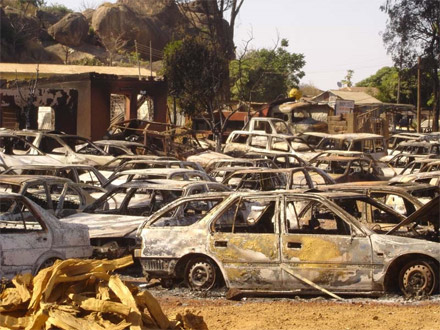Hundreds of people are reported [1] to have been killed in the violence that erupted in Jos, Plateau State, Central Nigeria on Friday November 28th over a disputed local election.

(Photo by citizen journalism portal Sahara Reporters [2])
Saralynn, a missionary based in Jos, described [3] the situation on Saturday:
I fled my house today.
David woke me up at about 06:45 to tell me he thought there was trouble. I'd heard the sirens in my sleep and realised with a start that I also heard gunshots. And the sirens were going on and on–one after another. There were local elections here yesterday, and the governor had deployed troops to keep the peace. But that was yesterday. […]
My parents’ driver/gardener came around 08:45 […]. He told us of youths on the streets, of burning tires, of soldiers, of people out with knives and big sticks.
Jeremy Weate of Naijablog reported [4] that blogger Talatu-Carmen [5] was locked-down in the family compound with a hundred other people. He also copied a letter sent by Zamani's farms in Jos to their customers about the situation in the city:
Two of our delivery staff — Audu, our head driver, and Ado, our delivery assistant — had their houses burnt down and lost all of their belongings. This afternoon I spent driving all around Jos looking for their families in some of the refugee camps set up around the town after people were evacuated from their area by the army. We finally found them, and brought them back to my compound. So we currently have about 25 refugees in the house. [..]
Moving around in Jos is not easy, and we are not sure when the situation will return to normal. Today we couldn't get to the farm (30km away from the house) because many of the roads were blocked and parts of Jos are under 24 hour curfew. Fortunately everything is normal at the farm and so far there have not been any incidents of violence in the rural areas around Jos. But it is impossible to get some items like onions and potatoes that we source locally because no one is coming in to Jos with these items. Everything in Jos — shops, markets, banks, etc.– are all closed and the city is virtually deserted. All the inhabitants are locked in their homes.
Adeola Aderounmu of the blog Thy Glory O Nigeria…! thinks [6] that “in Nigeria the politicians over the years have continued to blend politics and religion” and that Nigerian politics are a “winner takes all game”. Because of that, he thinks there will not be a punishment for the perpetrators of the riot killings:
In Jos-Nigeria, hundreds of people may have lost their lives because of an election that took the dimension of religious inclination. You can imagine that ignorance remains a weapon that has been used to send innocent people to their early graves. The perpetrators of these evil acts will never be found. They will never be brought to book. In Nigeria, this type of killing usually comes with the backings of some wicked politicians. The perpetrators enjoy privileged protection or anonymity and they will be unleashed again to do the same harm in the future. This is why religious riots or political riots associated with religion remains recurring incidents in Nigeria.
Naija Pundit of My Nigeria, on the other hand, doesn't think [7] that the riots have a religious root:
PDP and ANPP are secular parties which do contain religious fundamentalists in them, but those elements are the exception rather than the norm when it comes time to set party policies and activities.
What is going on in Jos right now is all about the perceived politics of disenfranchisement, and not religion.
[…]
So Nigerian papers say the strife was as a result of what is being perceived as a stolen election, but the BBC takes that, twists it around, and turns it into a story of Christians vs. Muslims, obviously a story that will garner more interest in the West, but one that sets religious relations back immensely across the board.
[…]
The wonders of western media… I guess next time there is economic beef going down in the UK, Nigerian media should say it is a race war between the white anglo-saxons and their former subjects from the continent or the island…
Osize Omoluabi of Mootbox points out [8] that “like every conflict in Nigeria, all parties involved can not seem to agree on the nature of the conflict”:
Some believe it is just a bunch of mean spirited thugs being used by a few godfathers to achieve political goals. Others claim it is an all out religious /ethnic violence. I will stick to what a wise old man told me ten years ago, he said, “when it comes to sectarian violence in Nigeria, in the end, all violence in Nigeria is driven by Economics”.
And he concludes:
As the unrest in Jos unfolds it is especially useful to keep in mind that Christians and Muslims live side by side in Jos and this arrangement has remained this way since these religions where introduced to the region. It is even more interesting that once this unrest passes, life will return to normal and these groups will go about their business and worship like nothing happened.
[…] It is noteworthy that if all parties involved, providing infrastructure for the government, building community and developing grass root ties for the different religious organizations, the city of Jos would not have been in its present state. Why can’t we all get along? Because there isn’t enough to go around.